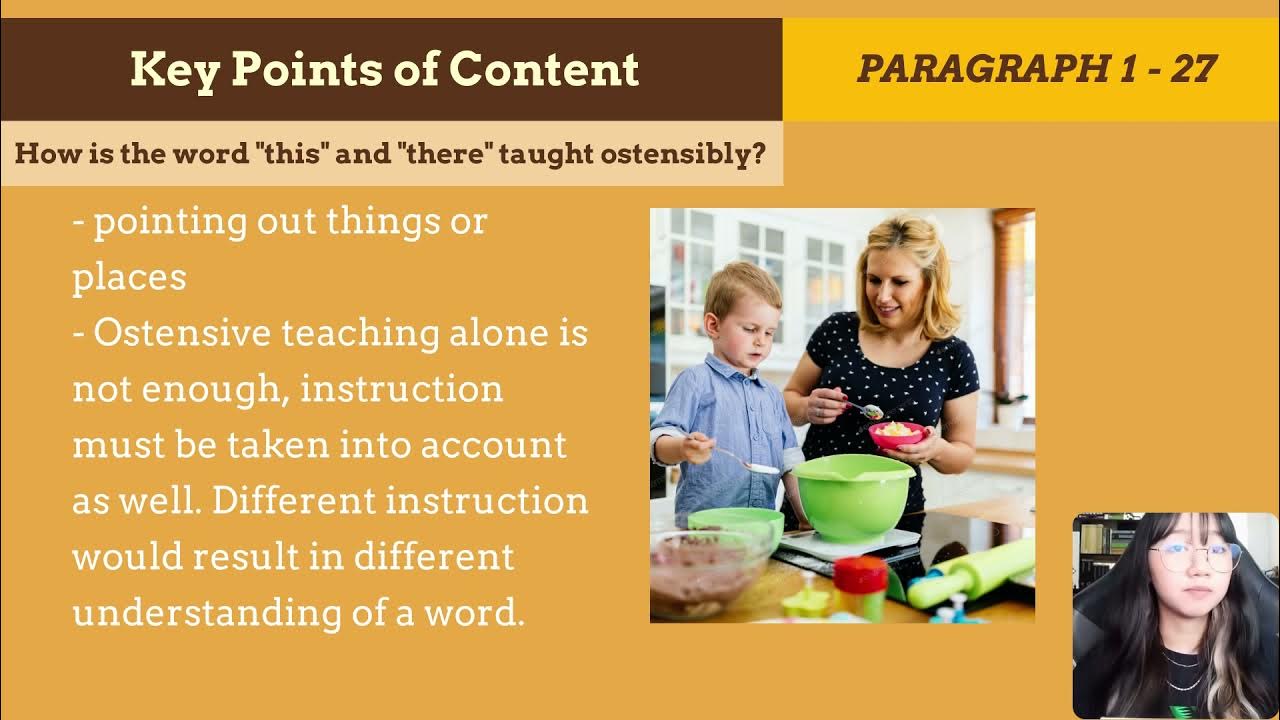Philosophy of language 5: Language games
Summary
TLDRThis lecture delves into Ludwig Wittgenstein's philosophical evolution, contrasting his early work in *Tractatus Logico-Philosophicus* with his later writings in *Philosophical Investigations*. The focus shifts from ideal language philosophy to a more pragmatic exploration of ordinary language. Wittgenstein introduces the concept of 'language games' to explain how words gain meaning through use in various contexts. The lecture also touches on Wittgenstein's rejection of the possibility of private language and explores debates on the origins of language, including behaviorism versus nativism in language acquisition.
Takeaways
- 😀 Wittgenstein's philosophy can be divided into two phases: Wittgenstein I (ideal language philosophy) and Wittgenstein II (ordinary language philosophy).
- 😀 In his early work, *Tractatus*, Wittgenstein focused on ideal language and the picture theory of language, which suggested that language represents the world like a picture.
- 😀 Wittgenstein later abandoned the picture theory of language, realizing it only applied to declarative sentences and could not account for other types of sentences (questions, commands, etc.).
- 😀 In his later work, *Philosophical Investigations*, Wittgenstein shifted focus to the use of natural language in everyday life, exploring the different functions of language.
- 😀 Wittgenstein's concept of 'language games' emphasizes that language is used in various ways depending on the context, and meaning is derived from these uses.
- 😀 The concept of family resemblance was introduced to explain that meanings in language overlap, much like family members share features without being identical.
- 😀 Wittgenstein's famous 'beetle in a box' thought experiment challenges the idea of private language, arguing that language must have public rules for communication to be possible.
- 😀 The rejection of private language led to the debate between behaviorism and nativism in understanding language acquisition and the nature of linguistic knowledge.
- 😀 Behaviorists, like J.B. Watson and B.F. Skinner, believed language is learned through interaction with the world, while nativists like Noam Chomsky argued that humans have an innate language faculty.
- 😀 Wittgenstein's approach influenced various fields, including philosophy of language, psychology, and linguistics, particularly in the understanding of how language functions and evolves in social contexts.
Q & A
What are the two main phases of Wittgenstein's philosophy?
-Wittgenstein's philosophy is divided into two main phases: Wittgenstein I (early phase), focused on ideal language philosophy and the picture theory of language, and Wittgenstein II (later phase), where he shifted to ordinary language philosophy, focusing on how language is used in everyday life.
What is the picture theory of language, and why did Wittgenstein abandon it?
-The picture theory of language, presented in Wittgenstein's early work *Tractatus*, suggested that sentences represent facts in the world, much like pictures do. Wittgenstein abandoned this theory because it only addressed declarative sentences and failed to explain other types of sentences like questions, commands, and exclamations.
How did Wittgenstein's approach to language change in his later work?
-In his later work, *Philosophical Investigations*, Wittgenstein moved away from constructing an ideal language and instead sought to describe how ordinary language functions in natural, everyday contexts. He introduced the concept of 'language games' to highlight the various ways language is used in different activities.
What are 'language games' according to Wittgenstein?
-'Language games' are practices or activities where people use language to communicate for various purposes. Wittgenstein argued that language consists of a variety of games, each with its own set of rules, and that the meaning of a word is determined by how it is used in these games.
What does Wittgenstein mean by 'family resemblances' in the context of language games?
-Family resemblances refer to the idea that, just as members of a family may share overlapping traits without having one common characteristic, different language games share similarities but cannot be unified under a single defining feature. This emphasizes the diversity of language uses.
What is Wittgenstein's argument against private language?
-Wittgenstein argued that language cannot be private, as its rules must be public to enable communication. If a language were private, its meaning would be unintelligible to others, and thus it would fail to function as a language for communication.
What is the 'beetle in a box' thought experiment, and what point does Wittgenstein make with it?
-The 'beetle in a box' thought experiment explores the idea that individuals might have different private experiences that they cannot share with others. Wittgenstein uses this to argue that the meaning of words, like 'pain,' cannot be understood through private experiences alone, as language is grounded in public use and communication.
How does Wittgenstein's view on language challenge the idea of a language of thought (mentalese)?
-Wittgenstein's view challenges the concept of a private 'language of thought' by arguing that all language must be public to function. Without public rules, there cannot be a meaningful language of thought, as it would lack the shared context necessary for communication.
What are the main differences between behaviorism and nativism in the philosophy of language?
-Behaviorism, associated with figures like B.F. Skinner and Willard Quine, suggests that language is learned through interaction with the environment and stimuli, such as pointing and naming. Nativism, advocated by Noam Chomsky, posits that humans are born with an innate capacity for language, including a universal grammar, which enables us to acquire language.
Why does Wittgenstein focus on the use of language rather than its representation of reality?
-Wittgenstein focuses on the use of language because he believes that meaning arises from how language is used in specific contexts and activities, rather than from representing external reality. This pragmatic view highlights the importance of context in understanding the meaning of words and sentences.
Outlines

This section is available to paid users only. Please upgrade to access this part.
Upgrade NowMindmap

This section is available to paid users only. Please upgrade to access this part.
Upgrade NowKeywords

This section is available to paid users only. Please upgrade to access this part.
Upgrade NowHighlights

This section is available to paid users only. Please upgrade to access this part.
Upgrade NowTranscripts

This section is available to paid users only. Please upgrade to access this part.
Upgrade NowBrowse More Related Video

PHILOSOPHY - Ludwig Wittgenstein

ОДНЕ МІРКУВАННЯ ПРО ОДНУ ДУМКУ ВІТҐЕНШТАЙНА (TLP, 2.0121)

Wittgenstein Tentang Filsafat Logika dan Matematika

Wittgenstein's Philosophical Investigations Sec. 1-27 & 66-71 Carolina_Derecho UPDEPPO Philosophy 1

Ludwig Wittgenstein on Language and Reality: The Philosophy on Constructing Meaning

Marx Parte 1
5.0 / 5 (0 votes)